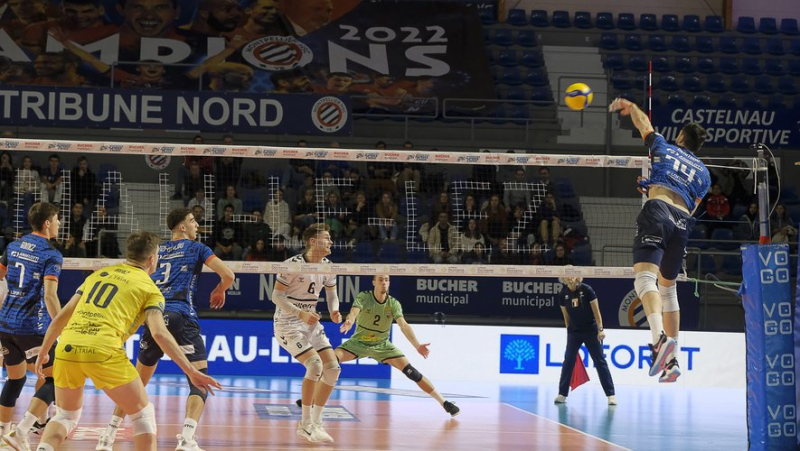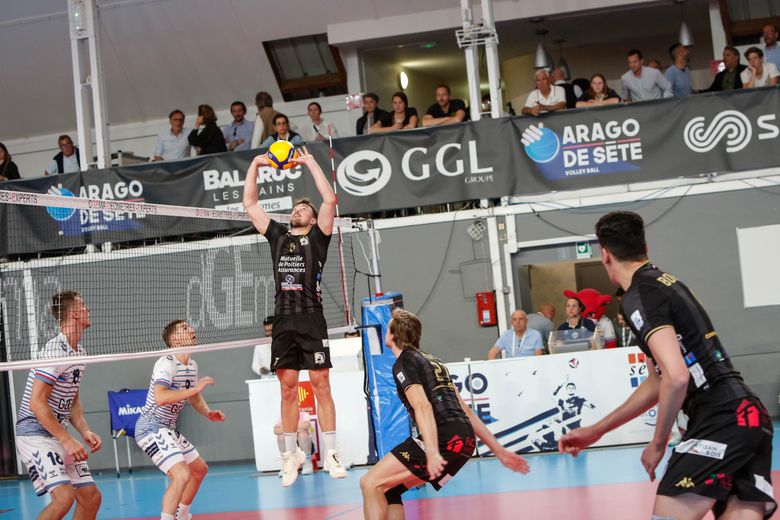Paris 2024 Olympic Games: Languedoc, the heart of French volleyball

Languedoc, the heart of French volleyball, like here in Montpellier. MAXPPP – Giacomo Italiano
From Montpellier to Narbonne via Sète, from gymnasiums to beaches via the villages of the hinterland, French volleyball has shined with particular brilliance for nearly 100 years on the banks of the Mediterranean, far from Paris which hosts the Olympic Games (July 26-August 11).
"For us, volleyball is the south!". Coming from a citizen of Brazil, where this sport is king, the words are almost gospel: Marcelo Fronckowiak is the coach of Tours, traveling on this March day to the & quot;Barrou", the enclosure of the Arago Sète.
The dilapidated and legendary room, with its warm audience "who pat your shoulder when you go to serve", according to former international Renaud Herpe (223 selections from 1995 to 2002), must be completely renovated from the start of the school year, closing the page of nearly 40 years of memories.
The city breathes volleyball. Sète, "it’is Georges Brassens and Arago", says Gérard Castan, former club player in the 1970s and city sports assistant.

The “Barrou”, enclosure of Arago de Sète. MAXPPP – © LEO ITARTE/CNB NEWS
"I don't know a Sétois who hasn't played or attended a match. Everyone plays volleyball on the beach on summer days, all the beach bars have a volleyball net", says the former manager of the beach ;French team.
The sand of the beaches and the floor of the halls: volleyball in Languedoc is based on these two pillars, which nourish the amateur or the professional twelve months out of twelve, or almost.
Renaud Herpe has played through the three flagship clubs in the Languedoc region (Montpellier, Sète and Narbonne, present in the 1st division 2024-2025). He remembers that then at the federal center (located in Montpellier), he "took the bus" to go play during his free weekends on the beaches of Palavas-les-Flots or Carnon.
"There weren't many courts, you had to fight to play", says the Narbonnais, crossed before a "derby" against Montpellier, in April.
Rivalries
The antagonisms mainly oppose Sétois and Montpellier residents and are verified on the sand every summer to the rhythm of the numerous tournaments, from La Grande-Motte to Gruissan via Valras-Plage.
"The rivalries in beach tournaments can be seen very clearly in the pre-war press reports: between the Sète and Montpellier teams… Fortunately there is a net", says Guy Laurans, doctor in sociology who studied, with his colleague Christian Guiraud, the establishment of volleyball in the ;rsquo;Hérault.
Introduced to France by American soldiers during the First World War, it immediately arrived on the shores of Hérault in a context of development of sports and leisure activities.
Retour en 📷 sur le derby héraultais
©️ @aragodesete #volley #volleyball #lam #lnv #volleyballplayer #volleyballteam #derby #montpellier #castelnaulelez #sete #herault #photo #photography pic.twitter.com/SjlEOsRS4s
— MHSC-VB (@MHSCVolley) December 5, 2022
"The first beach tournaments were organized in the 1920s. This led to relatively deep penetration of the Languedoc population", explains Guy Laurans.
Languedoc volleyball players also benefit from a local specificity, the soft ground, which allows them to develop their agility and technique, for example by diving to prevent the point from being lost, " ;which is difficult to do on hard ground in the Paris region, observes the sociologist."There is, I think, a technical-physical specificity of the Montpellier volleyball players, which would explain their domination after the Second World War : they put in place a spectacular game which apparently would be new in France", he continues.
With four French championship titles from 1947 to 1951, Montpellier UC (now MHSC, crowned in 2022) then reigns over French men's volleyball, while its women's section pockets three titles from 1949 to 1952.
Beaches and villages
Almost fifty years later, when beach volleyball became an Olympic sport, in 1996 in Atlanta, it was logical that the qualified French pair, composed of Christian Pénigaud and Jean-Philippe Jodard, has Languedoc as its training ground.
Ditto for Stéphane Canet and Mathieu Hamel, present at the Athens Games in 2004, who then founded Montpellier Beach Volleyball, the first club with a very high level in France.
J-15 ⏳
Nous étions au site de beach volley et le sable y est !
On compte les grains avant le grand jour ✨#Paris2024 pic.twitter.com/JsqoMySBJP— Paris 2024 (@Paris2024) July 11, 2024
Volleyball also spread to the countryside of the hinterland from the 1950s via rural homes and under the leadership of Fernand Soucailles, a local teacher de Pouzols.
This village located about thirty kilometers northwest of Montpellier became one of the best French rural volleyball clubs, winning for example the National Critérium without interruption from 1988 to 1992. It counted then, according to sociologist Guy Laurans, around fifty volleyball players for a population of 450 inhabitants.
Also read: Paris 2024 Olympic Games: calendar, date, location, history… Everything you need to know about beach volleyball
There is village volleyball like village rugby. And Renaud Herpe, 49 years old in a few days, recounts his childhood memories at the "Roubia tournament", to the northwest of Narbonne and which still exists: "All the local players came: for two days, 300 players were gathered in a village of around 500 inhabitants." Probably between two parties on the beach.




